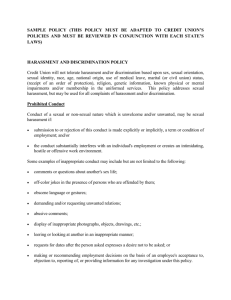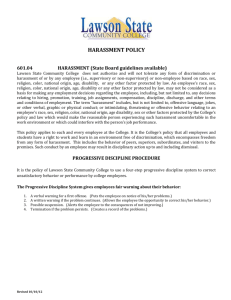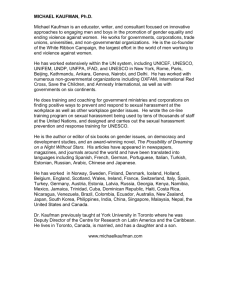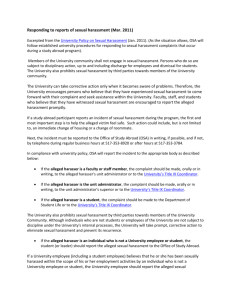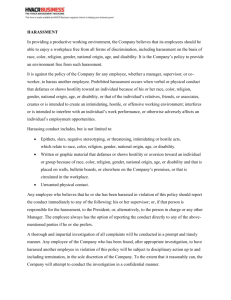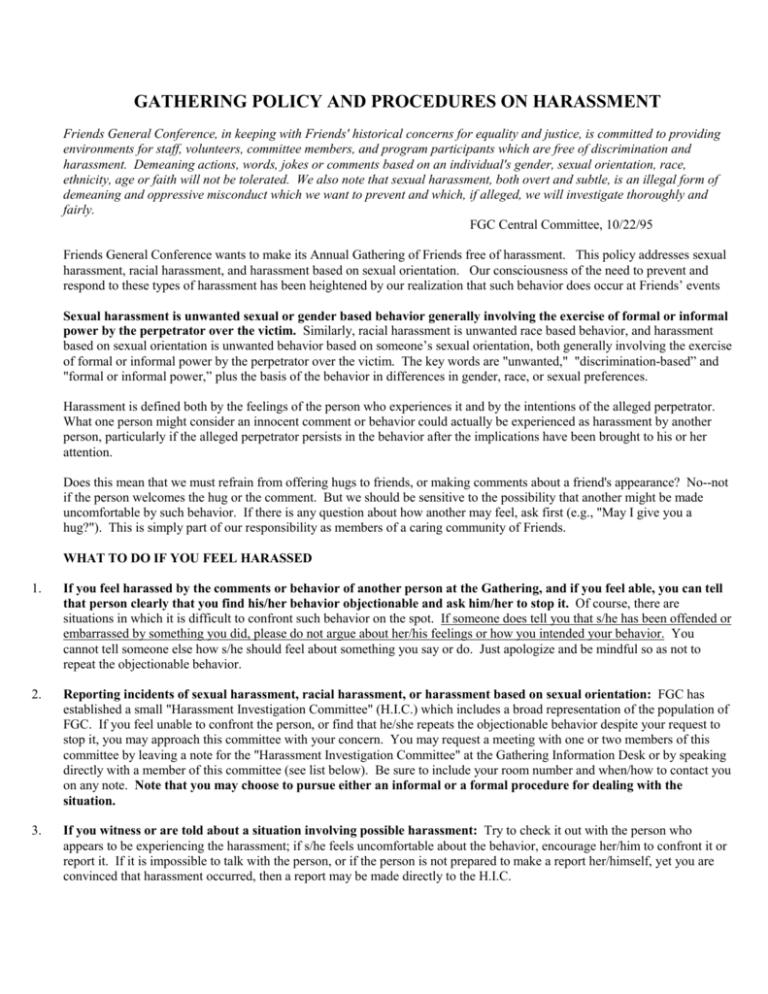
GATHERING POLICY AND PROCEDURES ON HARASSMENT
Friends General Conference, in keeping with Friends' historical concerns for equality and justice, is committed to providing
environments for staff, volunteers, committee members, and program participants which are free of discrimination and
harassment. Demeaning actions, words, jokes or comments based on an individual's gender, sexual orientation, race,
ethnicity, age or faith will not be tolerated. We also note that sexual harassment, both overt and subtle, is an illegal form of
demeaning and oppressive misconduct which we want to prevent and which, if alleged, we will investigate thoroughly and
fairly.
FGC Central Committee, 10/22/95
Friends General Conference wants to make its Annual Gathering of Friends free of harassment. This policy addresses sexual
harassment, racial harassment, and harassment based on sexual orientation. Our consciousness of the need to prevent and
respond to these types of harassment has been heightened by our realization that such behavior does occur at Friends’ events
Sexual harassment is unwanted sexual or gender based behavior generally involving the exercise of formal or informal
power by the perpetrator over the victim. Similarly, racial harassment is unwanted race based behavior, and harassment
based on sexual orientation is unwanted behavior based on someone’s sexual orientation, both generally involving the exercise
of formal or informal power by the perpetrator over the victim. The key words are "unwanted," "discrimination-based” and
"formal or informal power,” plus the basis of the behavior in differences in gender, race, or sexual preferences.
Harassment is defined both by the feelings of the person who experiences it and by the intentions of the alleged perpetrator.
What one person might consider an innocent comment or behavior could actually be experienced as harassment by another
person, particularly if the alleged perpetrator persists in the behavior after the implications have been brought to his or her
attention.
Does this mean that we must refrain from offering hugs to friends, or making comments about a friend's appearance? No--not
if the person welcomes the hug or the comment. But we should be sensitive to the possibility that another might be made
uncomfortable by such behavior. If there is any question about how another may feel, ask first (e.g., "May I give you a
hug?"). This is simply part of our responsibility as members of a caring community of Friends.
WHAT TO DO IF YOU FEEL HARASSED
1.
If you feel harassed by the comments or behavior of another person at the Gathering, and if you feel able, you can tell
that person clearly that you find his/her behavior objectionable and ask him/her to stop it. Of course, there are
situations in which it is difficult to confront such behavior on the spot. If someone does tell you that s/he has been offended or
embarrassed by something you did, please do not argue about her/his feelings or how you intended your behavior. You
cannot tell someone else how s/he should feel about something you say or do. Just apologize and be mindful so as not to
repeat the objectionable behavior.
2.
Reporting incidents of sexual harassment, racial harassment, or harassment based on sexual orientation: FGC has
established a small "Harassment Investigation Committee" (H.I.C.) which includes a broad representation of the population of
FGC. If you feel unable to confront the person, or find that he/she repeats the objectionable behavior despite your request to
stop it, you may approach this committee with your concern. You may request a meeting with one or two members of this
committee by leaving a note for the "Harassment Investigation Committee" at the Gathering Information Desk or by speaking
directly with a member of this committee (see list below). Be sure to include your room number and when/how to contact you
on any note. Note that you may choose to pursue either an informal or a formal procedure for dealing with the
situation.
3.
If you witness or are told about a situation involving possible harassment: Try to check it out with the person who
appears to be experiencing the harassment; if s/he feels uncomfortable about the behavior, encourage her/him to confront it or
report it. If it is impossible to talk with the person, or if the person is not prepared to make a report her/himself, yet you are
convinced that harassment occurred, then a report may be made directly to the H.I.C.
WHAT FGC'S HARASSMENT INVESTIGATION COMMITTEE WILL DO IN RESPONSE TO A REPORTED
INCIDENT OF HARASSMENT
1.
Informal procedure: If you feel embarrassed or offended by another's behavior, you may simply want an opportunity to
discuss the experience with another Friend and think together about how to handle it. If so, a member of the Harassment
Investigation Committee will be glad to meet with you for a confidential discussion of the incident(s). If this discussion is
sufficiently helpful, and you are able to stop or avoid further objectionable behavior, the H.I.C. will consider your concern to
have reached closure and no further steps will be taken unless the committee member determines that the nature of the
complaint is serious enough to warrant further action, such as a formal procedure.
2.
Formal procedure: If you wish a formal investigation and more assistance in dealing with the alleged harassment than that
afforded by the informal procedure, you will be asked to submit a written, signed complaint. This complaint may be brief, but
it should include name(s) and a description of the objectionable behavior, the context, and your feelings. When such a
complaint is received, two members of the Harassment Investigation Committee will meet with you in confidence, discuss the
alleged harassment with you, and then proceed with a thorough investigation of the complaint. Such investigation will always
include, but not necessarily be limited to, a meeting of the investigators with the alleged perpetrator. The H.I.C. reserves the
right to make an independent decision to initiate the formal procedure in any case which it deems sufficiently serious to
require a formal investigation and the possible consequences as listed below. In this event, both the complainant and the
alleged harasser will be notified of such a decision.
3.
The investigating members of the committee will reach a decision as to the merits and gravity of the complaint and
how to handle the situation. If the H.I.C. team determines that harassment did indeed occur, possible consequences include:
a) Asking the harasser to acknowledge and stop the offending behavior;
b) Requiring the harasser to stay away from the person who experienced the harassment for the duration of the Gathering,
c) Requiring the harasser to leave the Gathering, and/or
d) Refusing to accept the harasser at future Gatherings.
The investigating team will communicate its decision and the action taken to the individual who submitted the formal
complaint and to the full H.I.C. Any decision to exclude a harasser from future Gatherings may be appealed by the harasser to
the H.I.C. prior to the registration period for a subsequent Gathering.
4.
Complaints will be treated with confidentiality and discretion.
5.
Every effort will be made to protect persons making bona fide complaints from any kind of retaliatory action.
Members of the Harassment Investigation Committee during the 2005 Gathering of Friends are:
David Miller (Clerk of FGC Long-Range Conference Planning Committee), Bruce Birchard (FGC General Secretary), Marian Beane (FGC
Presiding Clerk), Julie Isaacs, (Personnel Committee), Francine Cheeks, Christopher Sammond..


